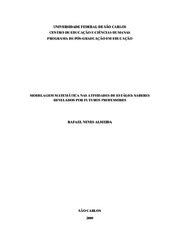| dc.contributor.author | Almeida, Rafael Neves | |
| dc.date.accessioned | 2016-06-02T19:39:05Z | |
| dc.date.available | 2009-12-09 | |
| dc.date.available | 2016-06-02T19:39:05Z | |
| dc.date.issued | 2009-08-28 | |
| dc.identifier.citation | ALMEIDA, Rafael Neves. Modelagem matemática nas atividades de estágio: saberes revelados por futuros professores. 2009. 144 f. Dissertação (Mestrado em Ciências Humanas) - Universidade Federal de São Carlos, São Carlos, 2009. | por |
| dc.identifier.uri | https://repositorio.ufscar.br/handle/ufscar/2508 | |
| dc.description.abstract | Based on the assumption that supervised internship is an important part of a teacher s education, this work sought to identify what are the possible relations/influences of mathematical modeling on the internship activities of a future mathematics teacher. A qualitative research was carried out in a public state school in the city of São Carlos and included the participation of two students of an Undergraduate Mathematics course (Teaching License). While these students were attending the subject Supervised Internship in Mathematics in Elementary Education 2, they joined the author of this research to design three projects of mathematical modeling for seventh-grade students. In the case study, the trainee teachers applied all the three projects, what resulted in an empirical material consisted of audio interviews with the trainee teachers, videos of the classes, documents produced by the seventh-grade students, and documents produced by the trainee teachers (field journals, reflective journals, and reports of the internship). The theoretical basis included works by Tardif (2002) and Mizukami (2004) for understanding how the teacher learning takes place, as well as works by Moura (1999) and Pimenta (2004), which contributed to the understanding of the supervised internship as an environment of teacher knowledge, while the studies by Borba (1999), Biembengut (1999) and Barbosa (2001c) allowed the construction of a concept on the use of mathematical modeling in Mathematics teaching. The focus of investigation was the way the trainee teachers acted in the supervised internship while developing projects of mathematical modeling. The idea was to analyze which types of knowledge, conflicts, and reflections they build in such process. The research showed both the potential of mathematical modeling being used in initial education as part of internship activities when undergraduates take their chances on their first experiences as teachers and the production of teacher knowledge. | eng |
| dc.description.sponsorship | Financiadora de Estudos e Projetos | |
| dc.format | application/pdf | por |
| dc.language | por | por |
| dc.publisher | Universidade Federal de São Carlos | por |
| dc.rights | Acesso Aberto | por |
| dc.subject | Educação matemática | por |
| dc.subject | Modelagem matemática | por |
| dc.subject | Formação inicial | por |
| dc.subject | Estágio supervisionado | por |
| dc.subject | Initial education | eng |
| dc.subject | Mathematical modeling | eng |
| dc.subject | Teacher internship | eng |
| dc.title | Modelagem matemática nas atividades de estágio: saberes revelados por futuros professores | por |
| dc.type | Dissertação | por |
| dc.contributor.advisor1 | Passos, Cármen Lúcia Brancaglion | |
| dc.contributor.advisor1Lattes | http://genos.cnpq.br:12010/dwlattes/owa/prc_imp_cv_int?f_cod=K4798906Z2 | por |
| dc.description.resumo | Este trabalho foi desenvolvido tendo como pressuposto a ideia de que o estágio supervisionado é um espaço importante na formação docente e se propôs a identificar quais as possíveis relações/influências da modelagem matemática como parte das atividades de estágio de futuros professores de matemática. A pesquisa, de cunho qualitativo, foi desenvolvida em uma escola pública estadual da cidade de São Carlos. Contou com a participação de dois estudantes do curso de Licenciatura em Matemática que cursavam a disciplina Estágio Supervisionado de Matemática na Educação Básica 2. Eles elaboraram, em parceria com o autor desta pesquisa, três projetos de modelagem matemática, que foram desenvolvidos com alunos da 7ª série do Ensino Fundamental. No estudo de caso, os graduandos desenvolveram os três projetos, gerando como material empírico: entrevistas com os estagiários, vídeos das aulas, documentos produzidos pelos alunos da escola e documentos produzidos pelos estagiários (diários de campo, diários reflexivos e relatórios do estágio). Como aportes teóricos foram considerados os trabalhos de Tardif (2002) e Mizukami (2004) para compreender como ocorre a aprendizagem docente; os trabalhos de Moura (1999) e Pimenta (2004) contribuíram para entender o Estágio Supervisionado como um ambiente de construção do saber docente e os estudos de Borba (1999), Biembengut (1999) e Barbosa (2001c), para construir uma concepção sobre o uso da modelagem matemática no ensino de Matemática. O foco de investigação foi a ação dos estagiários durante o estágio supervisionado, ao desenvolverem projetos de modelagem matemática, buscando analisar que saberes, conflitos e reflexões são produzidos por eles nesse processo. A pesquisa mostrou a potencialidade de a modelagem matemática ser abordada na formação inicial como parte das atividades de estágio, quando graduandos se aventuram nas primeiras experiências como professores, e evidenciou a produção de saberes docentes. | por |
| dc.publisher.country | BR | por |
| dc.publisher.initials | UFSCar | por |
| dc.publisher.program | Programa de Pós-Graduação em Educação - PPGE | por |
| dc.subject.cnpq | CIENCIAS HUMANAS::EDUCACAO | por |
| dc.contributor.authorlattes | http://lattes.cnpq.br/4005696619762748 | por |
